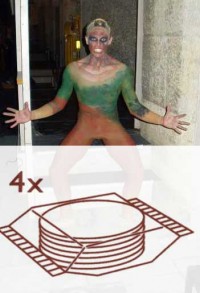
Most of the time, my experience, education, instinct and what I’ve picked up from friends and colleagues serves me quite well when it comes to speculating and arguing about music and dance issues. But I’ve found that it’s the views I am most certain of that my friends have had to disabuse me of.
“Surely”, I said to Dan (left) once, “If ever there was a case for using CD in a rehearsal, it’s for Rite of Spring. With a score that depends so much on rhythmic accuracy and colour, what’s the point of having it played on an instrument like the piano that can’t produce anything like the range of sounds that you need? Much as I would rather protect my own job, and promote live music, Rite seems to be begging for a CD.”
“Well, no, actually.” said Dan, and went on to explain how with a score as complex as Rite of Spring, rehearsing it to piano, at different speeds, and crucially, without the orchestration, gave him (he felt) the opportunity to form mental maps of the music, melodies and fragments as contours, rather than fixed aural images of sounds. So that if one day, an oboe were to play a tune instead of the clarinet, or a bass drum forgot to come in, you’d still know where you were, because your mental image is of the structure of the work, not a mirror image of a recording so precise that if the reality should veer from it but a jot, you might fail to recognise it.
Pondering this for the nth time the other day, my eye wandered to the side of a Nairn’s oatcake packet, which had a line drawing of one of the cellophane packets inside. It’s the kind of drawing that we’re used to seeing all the time, but we don’t question the fact that we need a diagram, not a photograph in order to make sense of what it’s telling us. Is this a parallel to hearing an orchestral score on the piano? And if you take it a step further, is this what a score is? And if you take it even further into what music might symbolise (if anything, depending your philophical bent) is music a kind of wireframe version of emotional states?
There are all kinds of arguments for live music, and all kinds for and against the piano, but Dan’s case for the piano in Rite rehearsals is one that has fascinated me and made me ponder for years. It’s thankfully made me a bit more cautious about assuming I know what works for other people’s heads musically.

